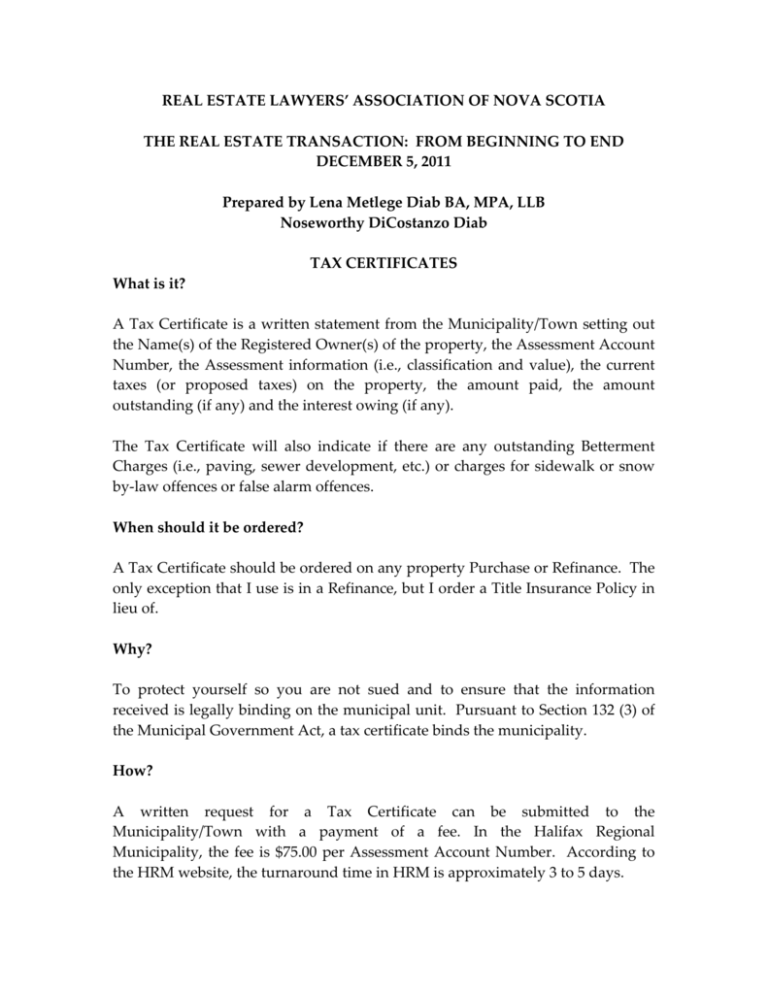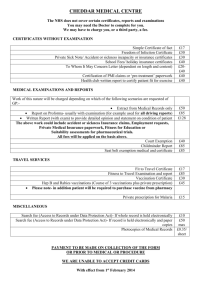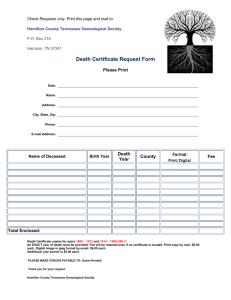Tax Certificate Memo - Lawyer's Insurance Association of Nova Scotia
advertisement

REAL ESTATE LAWYERS’ ASSOCIATION OF NOVA SCOTIA THE REAL ESTATE TRANSACTION: FROM BEGINNING TO END DECEMBER 5, 2011 Prepared by Lena Metlege Diab BA, MPA, LLB Noseworthy DiCostanzo Diab TAX CERTIFICATES What is it? A Tax Certificate is a written statement from the Municipality/Town setting out the Name(s) of the Registered Owner(s) of the property, the Assessment Account Number, the Assessment information (i.e., classification and value), the current taxes (or proposed taxes) on the property, the amount paid, the amount outstanding (if any) and the interest owing (if any). The Tax Certificate will also indicate if there are any outstanding Betterment Charges (i.e., paving, sewer development, etc.) or charges for sidewalk or snow by-­‐‑law offences or false alarm offences. When should it be ordered? A Tax Certificate should be ordered on any property Purchase or Refinance. The only exception that I use is in a Refinance, but I order a Title Insurance Policy in lieu of. Why? To protect yourself so you are not sued and to ensure that the information received is legally binding on the municipal unit. Pursuant to Section 132 (3) of the Municipal Government Act, a tax certificate binds the municipality. How? A written request for a Tax Certificate can be submitted to the Municipality/Town with a payment of a fee. In the Halifax Regional Municipality, the fee is $75.00 per Assessment Account Number. According to the HRM website, the turnaround time in HRM is approximately 3 to 5 days. The request for a Tax Certificate in the HRM must include the Assessment Account Number, the Name(s) of the Owner(s), a description of the property (this must include the Civic Number of the property, the Street Name and the Lot Number). If your request is for a Tax Certificate for a Condominium, the request must include the Unit Number of the Condo, the Level Number and the Suite Number. HRM also offers an On-­‐‑Line request service. This service offers the opportunity for high volume users to order Tax Certificates via the internet. The turnaround time for an On-­‐‑Line Tax Certificate is 2 to 3 business days and the Tax Certificate will be faxed to your office by HRM. For more information regarding On-­‐‑Line Tax Certificates, please e-­‐‑mail taxcert@halifax.ca or review the On-­‐‑Line Tax Certificates information sheet attached hereto. A sample Tax Certificate, as issued by HRM is attached hereto. If you are not ordering a Tax Certificate, you can obtain verbal confirmation from most Municipalities/Towns. Keep in mind, verbal confirmation is not legally binding and so you better protect yourself by ordering a Title Insurance Policy. HRM charges a fee of $30.00, plus applicable taxes, to respond to requests for Tax Account information. You will be required to phone 1-­‐‑900-­‐‑565-­‐‑9999 and the fee will be charged to your telephone bill. This fee is in accordance with By-­‐‑Law F-­‐‑ 300 and will be charged to all parties, including, but not limited to, law offices and legal representatives, real estate professionals, financial institutions and lending agencies. Please note, the 1-­‐‑900 service will have a preamble advising you of the cost of the service and that the information is not legally binding. You will be provided with the opportunity to not choose the service and disengage it by hanging up without incurring any charge. The preamble will also advise that you will be able to request tax information for up to three properties per call. Cautions The fiscal tax year runs from April 1st to March 31st in most Municipalities/Towns and the taxes are payable in two installments. Depending on the time of year you request the information; the tax rate may or may not be set by the Taxing Authority. This means the interim taxes may be based on last year’s records. A Tax Certificate does not tell you if the property is subject to an appeal. Newly created Subdivisions or newly registered Condominiums The Tax Account may not be created for the newly assessed property and you will therefore need to ensure the bulk taxes are paid and obtain an undertaking from the Solicitor for the pre-­‐‑subdivided Lot(s) or the Declarant of the Condominium, as the case may be. New Construction The assessed value will not be a true value of the finished dwelling and may only reflect the land value. This is because assessment is based on the fair market value (FMV) as of a state date of December 1st and if improvements are built on the land throughout the year, the FMV will not reflect these improvements until the following tax year.




